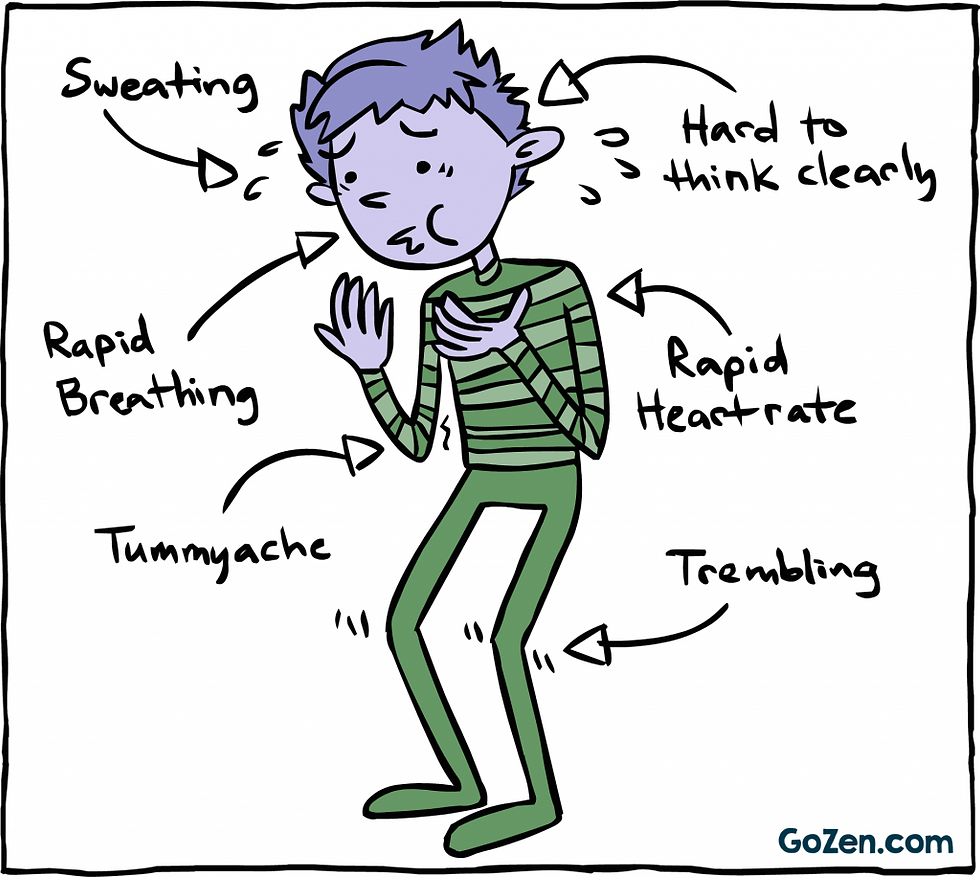Fighting Test Anxiety
By: Carlee & Dr. Miles

Fall is right around the corner, and many high school and college students have started their first few weeks of class. Some students can struggle with getting back into a school routine, but our education is necessary. Education shapes and strengthens our ideas, values, and perceptions on issues that we face today. Education also guides us into becoming active citizens that promote the well-being of communities in the United States and around the world.

School situations can increase anxiety in different ways, but a common type of anxiety can come from standardized testing. Test anxiety is the overwhelming fear of failing a test that negatively affects testing performance. Around 36 percent of students in the United States have moderate to severe test anxiety. These numbers are rising because of the rising importance of standardized testing. Test anxiety can include physiological, behavioral, and psychological symptoms including excessive sweating, rapid heartbeat, restlessness, and not being able to recall critical information.
Some anxiety is expected before a test, but too much anxiety can have several negative impacts. According to the American Test Anxieties Association (AMTAA), students who have moderate to high test anxiety achieve about a half of a letter grade below their peers. In the most severe cases, test anxiety can trigger panic attacks, where an individual might have similar symptoms of a heart attack and find it hard to breathe. All these effects can prevent students from reaching their full potentials, thus creating thoughts of self-doubt and lowering self-esteem.
Even worse, only a portion of students who suffer from test anxiety get the help they need. Social anxiety can be closely connected with test anxiety, so it could be hard to recognize a student that is struggling, and the student may find it hard to seek intervention.
Once we recognize a problem with test anxiety, we can use plenty of exercises and treatments to effectively manage anxiety. A good starting point is to mindfully regulate your time and organize your learning materials. Make sure you are prepared with any notes and other supplies needed for class. Preparation is the first step to developing good study habits.
Cramming information the night before will not properly prepare you for a test. Instead, take it step-by-step. Break up your studying between a few days for shorter periods of time. Checklists can be helpful for organizing preparation steps so everything is covered by the time testing comes around.
We all learn differently, so it is important to figure out which strategies are personally effective. If you learn better in a group setting, find a few people and form a study group. If you understand information better by reading the textbook, then create a study area that eliminates distractions. Put yourself into an environment that you will be able to strive in.
Sleep is vital to our learning process, so a lack of sleep can present difficulties in attention, concentration, and problem solving. Getting a good night’s sleep before a test will help your memory recall information that you have previously studied. It is just as important to get a full and healthy breakfast on test day. An empty stomach can make us irritable, sweaty, shaky, and queasy, which will make it very hard to keep our concentration. Bring a healthy snack to ensure that you are full and focused.

During your testing, make sure to read the directions carefully and take as much time as you need. If someone finishes before you, it doesn’t mean they will do better. When you find yourself drawing a blank, skip that question and return. When you revisit a problem, it may stimulate you to think from a different perspective. Often, individuals will engage in negative self-appraisal (negative self-talk) which will only further stimulate anxiety and self-doubt. Be kind to yourself, and try not to entertain automatic thoughts that pop up an only serve to criticize your abilities.
Also, use relaxation techniques. When anxiety becomes overwhelming, take long, deep breaths, and reassure yourself that you’re doing great. Another great trick is to take 5 slow, deep breaths before you even enter the testing room. This will help slow down your system and provide your brain with an optimal amount of oxygen. Remember that you are in control!
After a test is over, leave the worrying at the door. Don't get down on yourself for things that cannot be changed. Spend some time treating yourself for working hard! Once you are able to see how you did, review your test and come up with some things you improved on as well as some things that you may need to change.
Overcoming test anxiety does not happen overnight. It is a process and it involves making small steps everyday. Once you start finding personalized ways to study effectively and manage your anxiety, then confidence and success will follow.
References:
amtaa.org
studygs.net/tstprp8.htm
http://sas.calpoly.edu/asc/ssl/testanxiety.html
https://www.adaa.org/living-with-anxiety/children/test-anxiety
http://oureverydaylife.com/important-eat-breakfast-before-test-24179.html
